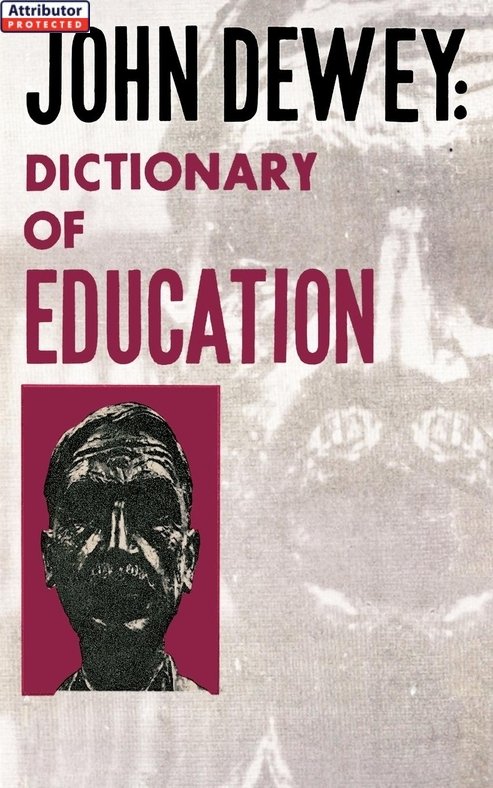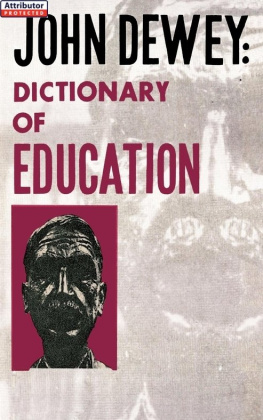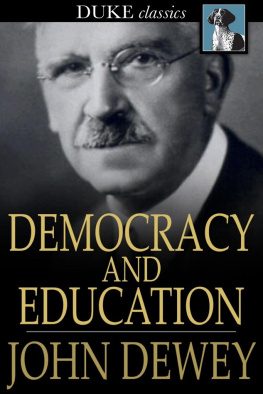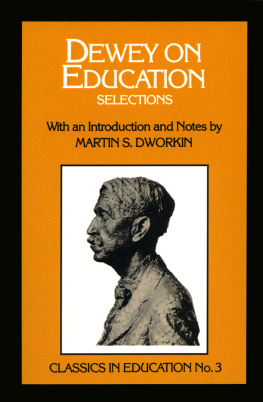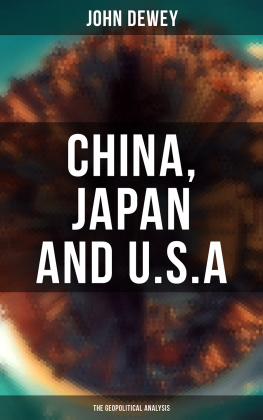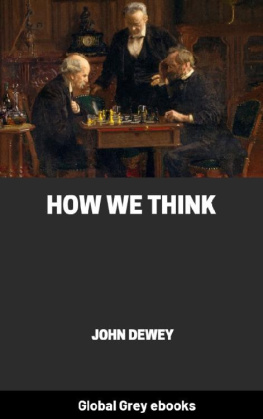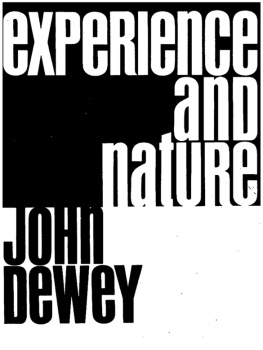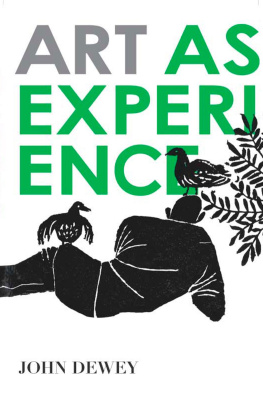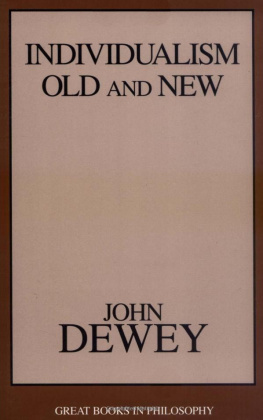ACKNOWLEDGMENT
The editor makes grateful acknowledgment to the following publishers and publications for permission to reprint from the works cited:
The American Teacher: Crisis in Education by John Dewey.
Antioch Review. Democratic Faith and Education by John Dewey.
Appleton-Century-Crofts, Inc : The Educational Frontier edited by William H. Kilpatrick, copyright, 1933, The Century Co, reprinted by permission of Appleton-Century-Crofts, Inc.
Beacon Press, Inc . Knowing and the Known by John Dewey and A F. Bentley, and Reconstruction in Philosophy by John Dewey.
Columbia University Press. Construction and Criticism by John Dewey, and Naturalism and the Human Spirit by Y. H. Krikorian.
Commentary Liberating the Social Scientist by John Dewey.
E. P. Dutton & Co, Inc. Schools of Tomorrow by John and Evelyn Dewey.
Fortune Magazine. Challenge to Liberal Thought by John Dewey.
Harcourt, Brace and Company: Recent Gains in American Civilization edited by Kirby Page.
Harper & Brothers Psychology by John Dewey.
Harvard University Press: Authority and the Individual.
D. C. Heath and Company How We Think by John Dewey.
Henry Holt and Company, Inc.: The Philosophy of John Dewey edited by Joseph Ratner.
Houghton Mifflin Company: Interest and Effort in Education and Moral Principles in Education by John Dewey.
The Humanist, published by the American Humanist Association, Yellow Springs, Ohio. Man and Mathematics by John Dewey.
League for Industrial Democracy: Education and the Social Order by John Dewey.
Liveright Publishing Corp.: Sources of a Science of Education by John Dewey.
Longmans, Green and Company: Essays, Philosophical and Psychological, in Honor of William James; and Whither Mankind edited by C. A. Beard.
The Macmillan Company. Contemporary American Philosophy by G. P. Adams and W. P. Montague; Democracy and Education, Encyclopedia of Education, and Encyclopedia of the Social Sciences by John Dewey.
The New Republic: Social Science and Social Control by John Dewey.
Northwestem University Press: The Philosophy of John Dewey edited P. A. Schilpp.
Open Court Publishing Company: Experience and Nature by John Dewey.
G. P. Putnams Sons Education Today edited by Joseph Ratner.
School and Society: Democracy and Educational Administration by John Dewey.
Simon and Schuster. Living Philosophers.
Random House, Inc.. Intelligence in the Modern World edited by Joseph Ratner
University of Chicago Press. Essays in Experimental Logic, The Elementary School Record and The School and Society by John Dewey; and The International Encyclopedia of Unified Science.
Yale University Press: A Common Faith by John Dewey.
A
ABSTRACTION
1. Abstraction is indispensable if one experience is to be applicable to other experiences. Every concrete experience in its totality is unique; it is itself, non-reduplicable. Taken in its full concreteness, it yields no instruction, it throws no light. What is called abstraction means that some phase of it is selected for the sake of the aid it gives in grasping something else. Taken by itself, it is a mangled fragment, a poor substitute for the living whole from which it is extracted. But viewed teleologically or practically, it represents the only way in which one experience can be made of any value for another... Looked at functionally, not structurally or statically, abstraction means that something has been released from one experience for transfer to another. Reconstruction in Philosophy.
2. There is no science without abstraction and abstraction means fundamentally that certain occurrences are removed from the dimension of familiar practical experience into that of reflective or theoretical inquiry. Sources of a Science of Education.
3. Something of the nature of abstraction is found in the case of all ideas and of all theories. Abstraction from assured and certain existential reference belongs to every suggestion of a possible solution; otherwise inquiry comes to an end and positive assertion takes its place. Knowing and the Known .
ACTION
1. We cannot seek or attain health, wealth, learning, justice, or kindness in general. Action is always specific, concrete, individualized, unique. Reconstruction in Philosophy.
2. Action is at the heart of ideas. The Quest for Certainty.
3. No mode of action can, as we have insisted, give anything approaching absolute certitude; it provides insurance but not assurance. Doing is always subject to peril, to the danger of frustration. Ibid.
AIMS AND PURPOSES
1. An aim denotes the result of any natural process brought to consciousness and made a factor in determining present observation and choice of ways of acting. It signifies that an activity has become intelligent. Specifically it means foresight of the alternative consequences attendant upon acting in a given situation in different ways, and the use of what is anticipated to direct observation and experiment. A true aim is thus opposed at every point to an aim which is imposed upon a process of action from without. The latter is fixed and rigid; it is not a stimulus to intelligence in the given situation, but is an externally dictated order to do such and such things. Instead of connecting directly with present activities, it is remote, divorced from the means by which it is to be reached. Instead of suggesting a freer and better balanced activity, it is a limit set to activity. In education, the currency of these externally imposed aims is responsible for the emphasis put upon the notion of preparation for a remote future and for rendering the work of both teacher and pupil mechanical and slavish. Democracy and Education.
2. All purpose is selective, and all intelligent action includes deliberate choice. A Common Faith.
3. Purposes exercise determining power in human conduct. The aims of philanthropists, of Florence Nightingale, of Howard, of Wilberforce, of Peabody, have not been idle dreams. They have modified institutions. Aims, ideals do not exist simply in mind; they exist in character, in personality and action. One might call the roll of artists, intellectual inquirers, parents, friends, citizens who are neighbors, to show that purposes exist in an operative way. Ibid.
ART
1. Works of art are the only media of complete and unhindered communication between man and man that can occur in the world full of gulfs and walls that limit community of experience. Art as Experience.
2. Because objects of art are expressive, they are a language. Rather they are many languages. For each art has its own medium and that medium is especially fitted for one kind of communication. Each medium says something that cannot be uttered as well and as completely in any other tongue. Ibid.
3. The arts which today have most vitality for the average person are things he does not take to be arts: for instance, the movie, jazzed music, the comic strip, and, too frequently, newspaper accounts of love-nests, murders, and exploits of bandits. For, when what he knows as art is relegated to the museum and gallery, the unconquerable impulse towards experiences enjoyable in themselves finds such outlet as the daily environment provides. Many a person who protests against the museum conception of art, still shares the fallacy from which the conception springs. For the popular notion comes from a separation of art from the objects and scenes of ordinary experience that many theorists and critics pride themselves upon holding and even elaborating. Ibid .
